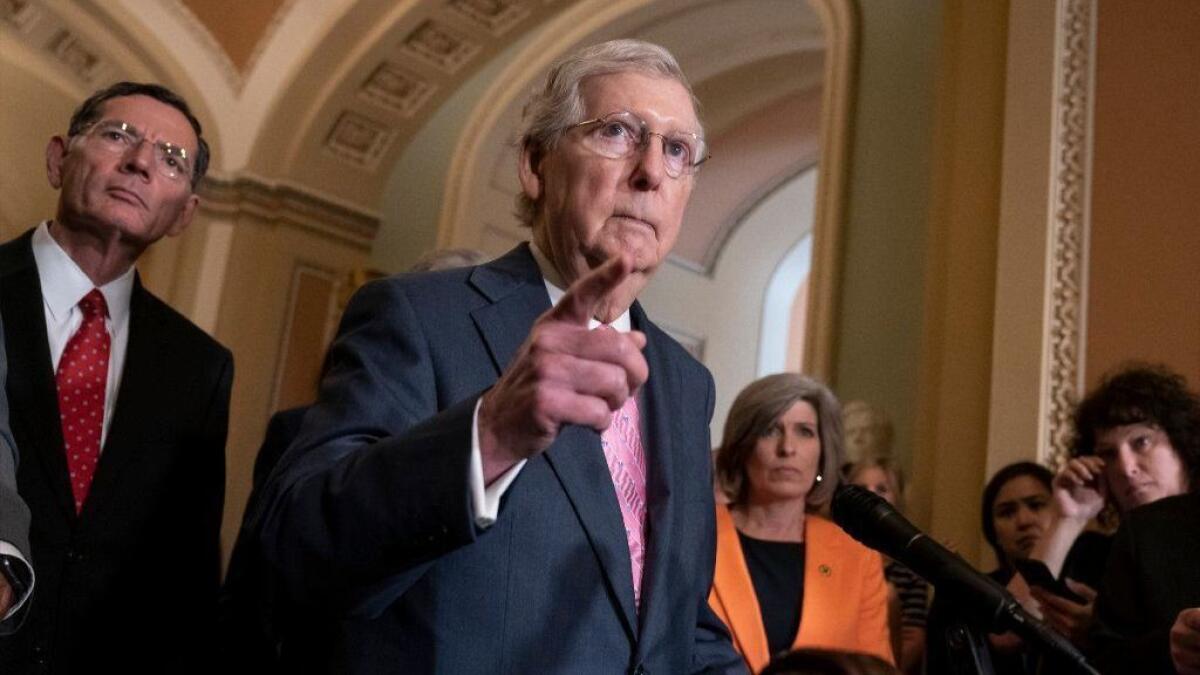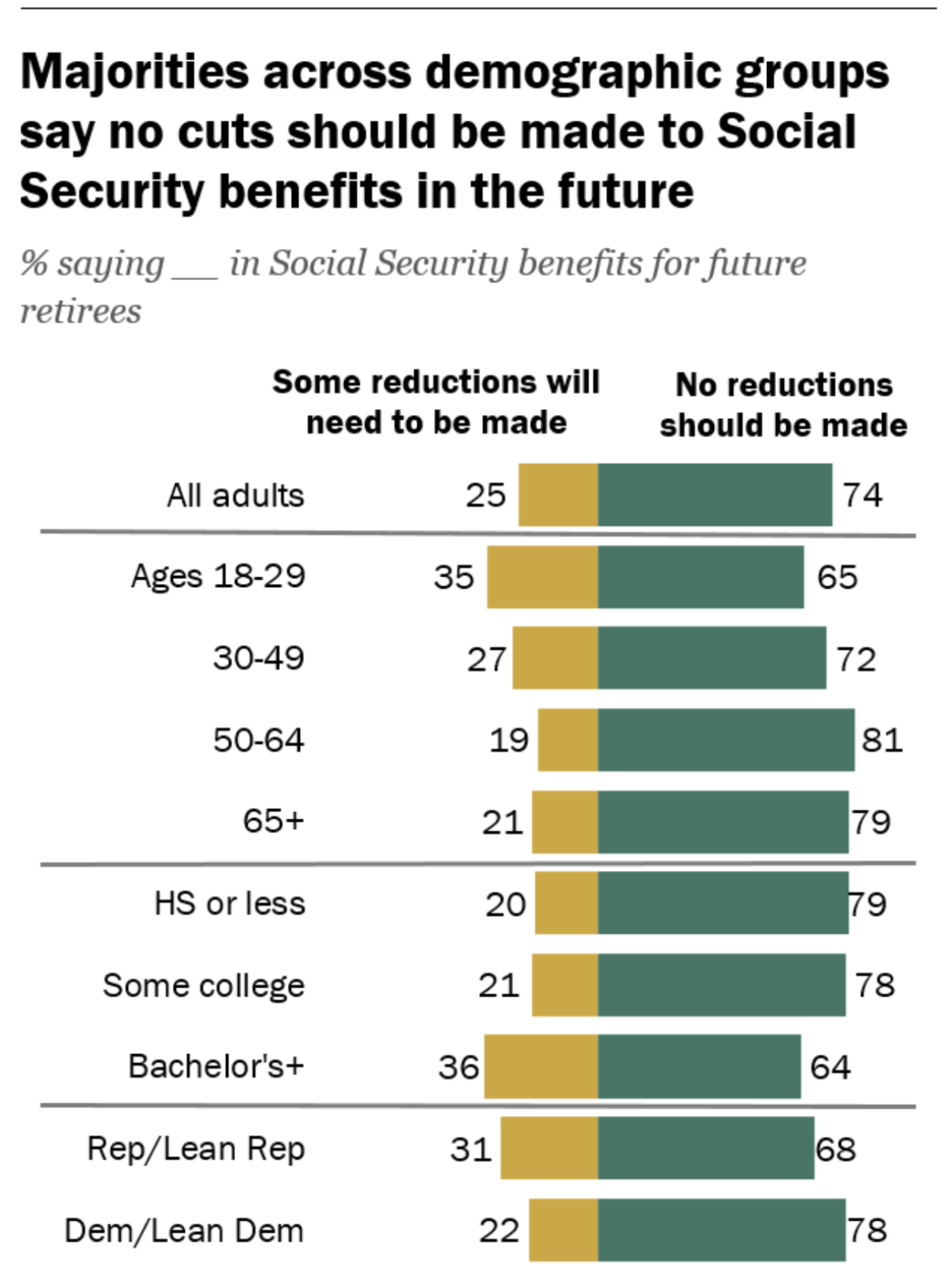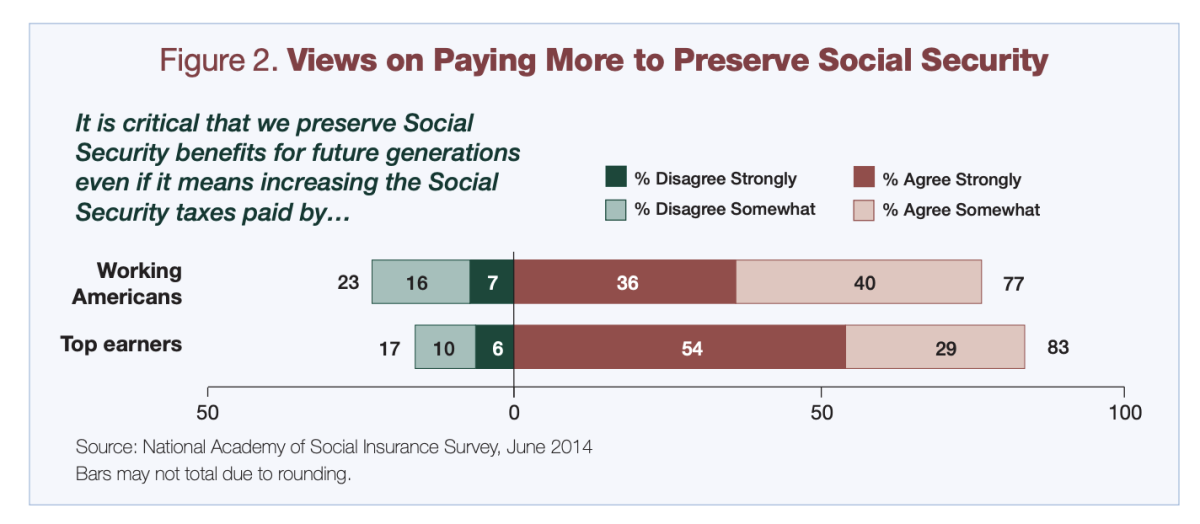Column: A Republican senator hints at gutting Social Security ‘behind closed doors’

Republicans in Congress have never been good at hiding their intentions to gut Social Security.
In recent years, GOP luminaries from Senate Majority Leader Mich McConnell of Kentucky down through Sen. Marco Rubio of Florida and former House Speaker Paul Ryan of Wisconsin have talked about the need to slash “entitlements” because, you know, the cost of programs such as Social Security and Medicare is driving the federal deficit, leaving so little room for tax-cut handouts to the wealthy.
Now Sen. Joni Ernst (R-Iowa) has added her voice to the discussion, with an added fillip. During a town hall appearance in her home state over the weekend, Ernst said members of Congress should hold discussions about Social Security “behind closed doors.”
The minute you say we need to address Social Security, the media is hammering you, the opposing party is hammering you — there goes granny over a cliff.
— Sen. Joni Ernst (R-Iowa)
Secrecy is essential, she said, “so we’re not being scrutinized by this group or the other, and just have an open and honest conversation about what are some of the ideas that we have for maintaining Social Security in the future.”

A video clip of Ernst’s appearance was unearthed and published by Democratic operatives. (The clip can be seen below.) It’s proper to note that Ernst doesn’t explicitly call for benefit cuts or privatizing Social Security. She talks fairly blandly about how “we as Congress will have to address the situation” and “to make sure that we’ve shored up that system” and about having “an open and honest conversation about what are some of the ideas that we have for maintaining Social Security in the future.”
But she gives away the game in other ways. To begin with, the only reason politicians ever take actions behind closed doors is that they know the results will be massively unpopular. Raising taxes on the rich to pay for Social Security benefits? That discussion can be held in the open, because the option is decisively favored in opinion polls. Cut benefits? That needs to be done in secret, because Americans overwhelmingly oppose it.
Moreover, Ernst is on record as favoring the privatization of Social Security, which means turning over the most successful government program in history to Wall Street, so that bankers can extract their vigorish. The evidence comes from a Republican primary debate in Iowa in 2014, aired on the CBS station in Des Moines.

Sen. Joni Ernst (R-Iowa) wants to “reform” Social Security behind closed doors
“We do have to reform Medicare, Medicaid and Social Security,” Ernst said. “And the way we do that with Social Security is by looking at transitioning our younger workers onto individual plans or individual savings accounts, whether that’s tied to the market, whether it’s based on interest rates -- however we want to do that, we can have that discussion.”
(Ernst’s statement was scrutinized by the fact-checking service PolitiFact, which wanted to judge whether an ad by her Democratic opponents was accurate in claiming she “would privatize Social Security.” Bizarrely, PolitiFact judged the ad “half true.” Chalk that up to yet another blunder by blinkered fact-checkers.)
Feeling their progressive oats after a few years in the wilderness, House Democrats on Tuesday revived a proposal to increase and expand Social Security benefits while making the program more solvent for the foreseeable future.
The best evidence that Ernst is talking about cutting benefits is that during her town hall, she rationalized holding “reform” discussions in secret because no one has the courage to talk about Social Security in public. “The minute you say we need to address Social Security, the media is hammering you, the opposing party is hammering you — there goes granny over a cliff,” Ernst said. “But there is a real issue out there, and as long as we are being hammered as members of Congress for even saying we need to do something about it, you’re not going to find people that are willing to step forward and do it.”

This is, actually, utterly untrue. Plenty of politicians are willing to talk about addressing Social Security. Two proposals on Social Security have been introduced in Congress, with the full pageantry of Washington news conferences and news releases.
They’re the Social Security 2100 Act, introduced by Rep. John B. Larson (D-Conn.), and the Social Security Expansion Act, filed by Sen. Bernie Sanders (I-Vt.), a candidate for president, and Rep. Peter A. DeFazio (D-Ore). They’ve been introduced in public because they’re about expanding benefits and making the wealthy pay their fair share, not about cutting benefits and protecting the wealthy from the cost.
We’ve been making the case for years that the proper approach to Social Security is to expand it -- increase benefits and bring more people into its embrace, including college-age survivors of deceased workers.
Sen. Elizabeth Warren (D-Mass.), who like Sanders is running for the Democratic nomination for president, also has been forthright about Social Security. She advocates expanding benefits and raising taxes on the wealthy, who escape most Social Security taxation, and she’s adamantly opposed to privatization.
In other words, when dealing with Republican options for “reforming” Social Security, one has to read between the lines. Their agenda hasn’t changed since Alf Landon made repealing Social Security the central plank of his presidential campaign against Franklin Roosevelt in 1936. Roosevelt tied Landon to employers who had been slipping anti-Social Security propaganda into their workers’ pay envelopes.
“Only desperate men with their backs to the wall would descend so far below the level of decent citizenship as to foster the current pay-envelope campaign against America’s working people,” Roosevelt thundered. Landon got buried in a landslide.
Republicans learned their lesson in 1936, and never forgot it: If you’re going to attack the retirement security of ordinary Americans, make sure you talk about it not out loud, but behind closed doors.
More to Read
Inside the business of entertainment
The Wide Shot brings you news, analysis and insights on everything from streaming wars to production — and what it all means for the future.
You may occasionally receive promotional content from the Los Angeles Times.











